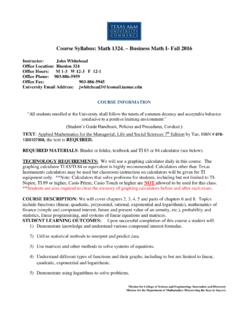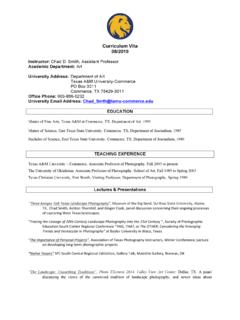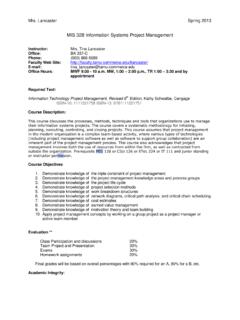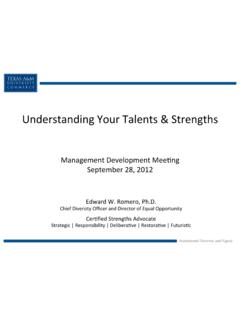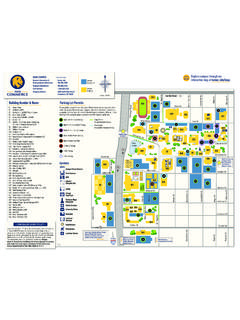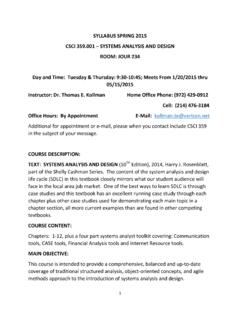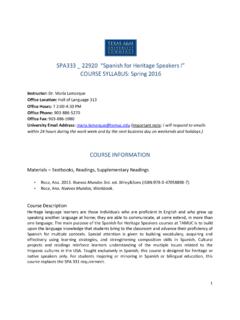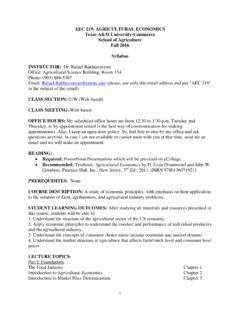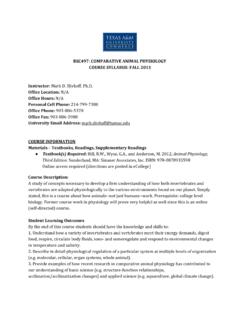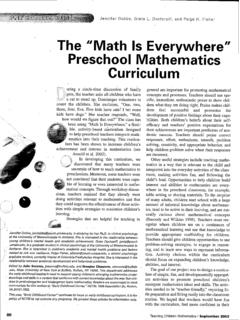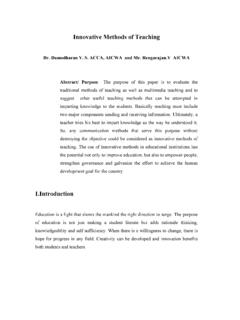Transcription of ECE 560: Early Childhood Curriculum Design …
1 Page 1 of 9 ECE 560: Early Childhood Curriculum Design course syllabus : FALL 2012 Instructor: David L. Brown, Office Location: Education South, 229 Office Hours: By Appointment Office Phone: 903-886-5536 Office Fax: 903-886-5581 University Email Address: course INFORMATION Class Meetings: Aug 28 Tuesday 4:30 PM 7:10 PM Sep 04 Tuesday 4:30 PM 7:10 PM Sep 11 Tuesday 4:30 PM 7:10 PM Sep 18 Tuesday 4:30 PM 7:10 PM Sep 25 Tuesday 4:30 PM 7:10 PM Oct 02 Tuesday 4:30 PM 7:10 PM Oct 09 Tuesday 4:30 PM 7:10 PM Oct 16 Tuesday 4:30 PM 7:10 PM Oct 23 Tuesday 4:30 PM 7:10 PM Oct 30 Tuesday 4:30 PM 7:10 PM Nov 06 Tuesday 4:30 PM 7:10 PM Nov 13 Tuesday 4:30 PM 7:10 PM Nov 20 Tuesday 4:30 PM 7:10 PM Nov 27 Tuesday 4:30 PM 7:10 PM Dec 04 Tuesday 4:30 PM 7:10 PM Dec 11 Tuesday 4:30 PM 7.
2 10 PM * Denotes Instructor Attending Conference (if indicated above) Materials Textbooks, Readings, Supplementary Readings: 1. Roopnarine, Jaipaul & Johnson, James E. (2008). Approaches to Early Childhood Education, (5th Edition). Columbus, OH: Pearson/Merrill/Prentice-Hall. 2. Goffin, Stacie & Wilson, Catherine. (2001). Curriculum Models and Early Childhood Education: Appraising the Relationship, (2nd Edition). Columbus, OH: Merrill/Prentice-Hall. Page 2 of 9 course Description: This course will explore various Curriculum models and underlying theories utilized in designing Early Childhood Curriculum . Additionally, participants will examine factors which have influenced Curriculum development in Early Childhood Education. Moreover, participants will determine how certain factors have influenced the development of a variety of Curriculum models which have shaped present Curriculum in Early Childhood education.
3 Student Learning Outcomes: 1) To identify significant factors that has influenced Curriculum development in Early Childhood education. 2) To examine Curriculum models that have been used in a variety of Early Childhood programs. 3) To critique Early Childhood Curriculum models and curricula in light of issues of culture, philosophy, content, implementation, and state and national standards. 4) To generate an Early Childhood Curriculum framework that reflects best practices to promote the growth and development of all children . 5) Describe distinguishing features of major Early Childhood curricula models and programs. 6) Classify different Early Childhood curricula models in relations to the philosophical/theoretical/historical bases of the Curriculum model. 7) Demonstrate leadership ability as a professional educator for analyzing Curriculum materials and models with particular attention to assessment, content, connections and alignment to state and national standards.
4 8) Synthesize knowledge of evaluation research involving the comparisons of Curriculum models. 9) Examine the relationship among theory, research, and practice regarding major Curriculum models. 10) Continue the development of a personal philosophy and knowledge base necessary to provide leadership in Curriculum development and implementation in the field of Early Childhood Education. course REQUIREMENTS course Assignment/Requirements: A) Each student will attend and participate in discussions, readings, and collaborative activities during each class session. Additionally, each student will complete assigned readings and be ready to share and discuss in class. Class participation is defined as regular attendance to class, coming to class prepared by having read the assigned readings; formulating questions for class discussion; active participation during in-class activities and discussions; and displaying professional conduct during class.
5 B) Curriculum Program/Model PowerPoint Presentation: Each student will select a Curriculum model to research and prepare a presentation of the model/program that incorporates theoretically sound learning principles. The presentation should involve the audience as active learners and provide a comprehensive review including the theoretical philosophies, Curriculum implementation, criticisms, assessment, and historical and contemporary supporters. A week prior to the presentation, students Page 3 of 9 should provide the Instructor with a detailed outline of the topics and information that will be addressed in the presentation for approval. Students are expected to include the following in their presentations: 1) chart/table differentiate your key model with another major model 2) Web of various components of the model and 3) a description of philosophy that relates to model.
6 Be sure to include your thoughts on the merits of such model in terms of meeting the needs of children and families. The information must go beyond what is covered in the book. Your investigation of the model should include/but not limited to the following in your class discussion and presentation: 1) What the model looks like in the classroom. 2) The theoretical basis for the model/program. 3) The historical evolution of the program/model. 4) What others have said about the model: formal evaluations including critiques of its effectiveness and theoretical soundness. 5) Implications for the model across age levels in Early Childhood education (EC-4th grade) 6) An evaluation of this model in terms of its theoretical connections (or lack of connections) to state and national standards. Please consult Websites, Textbooks, Articles, and other resources for information on your program or model.
7 Create a handout that will guide the discussion of this model. Bring enough copies for every class member. (100 pts) C) Each student will select a position statement on Curriculum development in Early Childhood Education. Students should read the position statement and write a 2-3 page synthesis of the major ideas and suggestions regarding Curriculum development and implementation in Early Childhood education. (35 pts) D) Each student will individually write a paper based on the information gathered in the Curriculum model presentation. The purpose of this paper is to provide a professional examination/critique of the Curriculum /program model. Specifically, the paper should reference all areas that are referenced in course assignment (B). All written assignments should follow the American Psychological Associations format for writing professional papers and reports.
8 Please include the bibliography of the citations used in writing the paper. The paper should be double-spaced and contain 4- 6 pages (excluding the bibliography). (100 pts) E) Each Student will select chapters from textbook and develop a written Chapter Summary or PowerPoint handout of key ideas in chapter. Copies of the Chapter Summary or PowerPoint handout should be made for all class members and distributed during the presentation of chapters to class. (65 pts) The Curriculum /program models to be examined include: A. Montessori K. Parents as Teachers B. Project Approach L. HIPPY Program C. High Scope M. Leap Frog Curriculum D. Bank Street N. HOSO Math/Science E. Reggio Emilia O. Anti-Bias Curriculum F. Waldorf P. Open Court Reading Program G. Constructivist Teaching Q. Sesame Street Curriculum H. Protect Zer0 (Multiple Intelligences) R.
9 Arts-Based Curriculum I. Path-Social Emotional Curriculum S. HighReach Learning Program J. creative Curriculum Page 4 of 9 Grading Curriculum model PowerPoint presentation 100 pts Chapter Summaries 65 pts Professional Paper/ Curriculum model 100 pts Review of Position paper 35 pts _____ Total 300 pts TECHNOLOGY REQUIREMENTS This is not an Online course but some technological resources will be required. Access to a Computer with Internet Access. Microsoft Word Processing Software. Microsoft Power Point Software. Adobe or Foxit Reader to open PDF File. COMMUNICATION AND SUPPORT Interaction with Instructor Statement: Participation & Communication: Each of you are expected to participate fully in assigned readings related to course topics, chapter presentations, discussions of current articles, and presentations of math science lessons.
10 Your active and thoughtful participation is expected in course assignments. Regular attendance is necessary and will be expected of all students. In regards to communication, please use my email to correspond with me regarding class matters. Also, I will be happy to schedule individual appointments with you, if needed. Also, I will post readings on my website for individual assignments. Students will be provided information to access documents on the website. course AND UNIVERSITY PROCEDURES/POLICIES course Specific Procedures: Citizenship: All Students enrolled at the University shall follow the tenets of common decency and acceptable behavior conducive to a positive learning environment. (See Student 92s Guide Handbook, Policies and Procedures, Conduct). Late Work: Late work is not accepted. You will have plenty of notification and time to complete course assignments.
